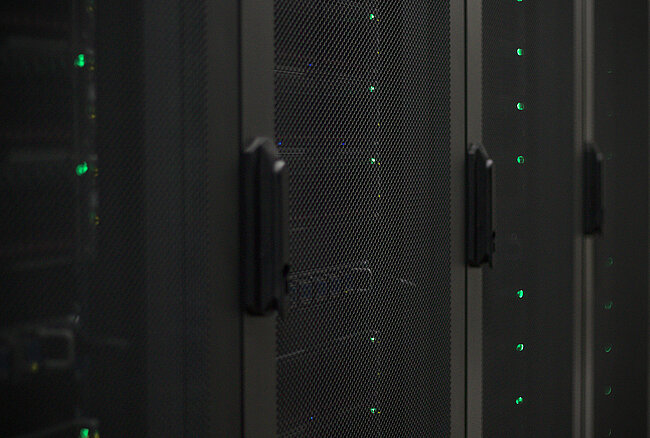Nationwide HPC systems
HpcBasisCluster.nrw and hpcFachCluster.nrw
In line with the principles set out in the state-level concept (Landeskonzept), the hpcCluster.nrw is being developed to consolidate Tier-3 HPC resources in North Rhine-Westphalia at four central locations, thereby making optimal use of synergies and economies of scale. One location will host the general hpcBasisCluster.nrw, while three additional sites will accommodate thematically specialized hpcFachCluster.nrw.

hpcBasisCluster.nrw
The hpcBasisCluster.nrw provides high-performance computing (HPC) capacities for universities that do not have their own Tier-3 system or that wish to cover their additional computing needs. This shared HPC cluster is intended to offer a cost- and energy-efficient alternative to setting up numerous smaller local systems.
It is being established and operated at the University of Cologne and serves as a basic supply of HPC capacities. The cluster is designed to provide low-threshold access to HPC resources and thus complement the existing digital ecosystem for HPC in the state.
The system will dedicate 80% of its resources to specialized AI workloads. Universities had the opportunity to acquire usage rights in advance; expressions of interest for the first phase have already been completed. The cluster will be procured in the course of 2025 and is scheduled to go into operation at the beginning of 2026. A second expansion stage is planned for 2027.
hpcFachCluster.nrw
The hpcFachCluster.nrw provides high-performance computing (HPC) capacities across North Rhine-Westphalia for all universities in the state. It is distributed across three sites with different disciplinary focuses and replaces the previous Tier-3 backup services previously provided by the Tier-2 centers in the region. Regardless of the disciplinary focus, all hpcFachCluster.nrw sites will support machine learning as a core technology.
University of Paderborn – Physics and Chemistry
At the University of Paderborn, the hpcFachCluster.nrw for Physics and Chemistry is being established. Expressions of interest from universities have been completed, and the cluster is scheduled to go into operation by the end of 2026.
RWTH Aachen University – Engineering
The hpcFachCluster.nrw for Engineering is being set up at RWTH Aachen. Here too, expressions of interest have already been completed, and the cluster is expected to become operational by the end of 2026.
University of Duisburg-Essen for the UA Ruhr – Biology, Biochemistry, and Applied Mathematics
At the University of Duisburg-Essen, the hpcFachCluster.nrw for Biology, Biochemistry, and Applied Mathematics is being established. Expressions of interest from universities are expected to begin in autumn 2025.
FAQ on the first expansion phase of the hpcBasisCluster.nrw
ATTENTION: ERROR IN THE COST CALCULATION
An error occurred in the original calculation of the operating costs. The corrected calculation is as follows:
“Based on an operating time of 8,640 hours per year with five days of maintenance, the annual operating costs would amount to €950,460.48. With a personal contribution of €15,000 investment, the resulting annual operating costs would be €17,281.10. This corresponds to approximately 1.82% of the total system (including the state’s share).”
Please note that these operating costs are an estimate based on our previous experience. The final billing will be carried out according to the actual electricity consumption and will be proportionally allocated through a fair-use settlement.